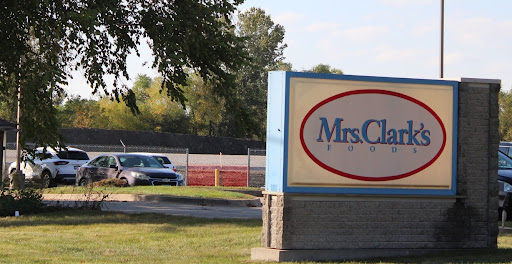ABI Manufacturing Conference addresses automation, workforce, supply


Finding talent, adopting artificial intelligence and managing supply chains were top of mind for Iowa manufacturing leaders at the Iowa Manufacturing Conference this week.
On the tail end of its nine-city, 10-day Elevate Iowa Manufacturing RV Tour celebrating manufacturers throughout the state, the Iowa Association of Business and Industry hosted its annual manufacturing conference on Oct. 14 at Prairie Meadows in Altoona. October is Manufacturing Month.
The conference, attended by 350 people, kicked off with a panel discussion about the state of manufacturing in Iowa led by Iowa Economic Development Authority Director Debi Durham. Panelists included Megan Weiler Green, CFO and general counsel at Weiler in Knoxville; Nate Weaton, president and CEO at Weaton Cos. and Connor Deering, CEO at Cemen Tech.
Durham said manufacturing, which is Iowa’s largest economic sector, includes more than 4,200 companies producing 222,000 items, exporting over $15.2 billion in goods. In Iowa, the industry’s average salary is $75,000 and the state ranks third nationally for the percentage of workforce in manufacturing.
“Today’s manufacturers are navigating a landscape marked by economic uncertainty, volatile international trade policies and rapid technology change. Tariffs and shifting global alliances continue to impact supply chains and pricing. Inflationary pressures and interest rates fluctuations are affecting capital investment decisions and workforce challenges remain a top concern, especially as automation and digital transformation reshape the skills required in factory floors,” Durham said.
Iowa’s Manufacturing 4.0 initiative, administered by IEDA and Iowa State University’s Center for Industrial Research and Service, encourages globalization of products through the use of new technologies. Durham said the initiative has awarded more than $30 million in grants to support about 300 projects, for a total investment of $70 million. The next funding round is opening earlier than usual this year, she said.
“These investments are helping Iowa companies modernize, stay competitive and create new opportunities,” Durham said.
Incorporating AI and automation
Weiler manufactures heavy equipment for the asphalt and road building industries and is exploring ways to use more automation on the factory floor and AI on the business side. Increased automation is intended to improve safety and reduce the amount of repetitive, tedious tasks workers perform, allowing them to focus instead on more complex work, Weiler Green said. AI may allow the company to take action on their data.
“We’re particularly trying to use AI for mining the data that we already have and making it more usable. I think we’re probably all guilty of creating a report and having that report emailed out every Monday morning, and then, we’ll look at it the first two weeks and never again. We’re trying to use AI to leverage some of that data and give us actual actionable [strategies] out of that information,” she said.
Along those lines, Deering said the speed at which technology is changing has been a challenge.
“I think the organizations that can harness the labor force and the technology and [sync] those two things together are going to win, and it’s going to be incredibly challenging,” he said. “The rate of change that we’re going to see in the manufacturing sector in the next five to 10 years is going to be astonishing.”
Supply chain and tariffs
Reshoring efforts will likely lead to changes in the supply chain and increased traceability. More companies will increasingly look to domestic suppliers for materials and components, not just to say a product was made in the U.S., but also to avoid geopolitical risks, Weaton said. His company manufactures custom architectural products, largely for churches and other religious buildings.
“Supply chain is certainly a large trend that is going to come back to the forefront. If you look at everything that’s going on in trade and everything that’s going on with tariffs and things like that, I think you’re going to see a massive shift to more regional or more local supply chain initiatives,” he said.
Traceability to determine whether products are actually produced in the U.S. will become a larger concern, as well.
“As we put an emphasis on bringing manufacturing back and really creating a robust manufacturing environment, I think traceability is going to be a big, big trend going forward. You can’t just say it’s ‘Made in the USA’ anymore,” Weaton said. “You have to have traceability, and the administration and companies are going to put a requirement on doing what you say you’re doing.”
When it comes to tariffs, panelists said their companies rely largely on domestic suppliers for parts and materials, so tariffs have not directly affected their businesses in a significant way. However some suppliers, foreign and domestic, have been opportunistic about pricing, even if those parts were already in stock.
“Or, we’re getting letters that say, ‘We don’t really know what tariff is going to apply, so we’re going to charge a 50% tariff and we’ll figure it all out later,’” Weiler Green said. “Things like that kind of make you lose faith, but you have to have good relationships with partners with who you believe are not going to treat you that way.”
Workforce
Durham asked panelists what Gov. Kim Reynolds could do during her final legislative session to improve business conditions in Iowa.
Weiler Green said her company needs more workers.
“We need more people, and I don’t know how you accomplish that,” she said. “I think that Iowa has a lot to offer and a lot to give. And the people who move here like it here and want to stay, but we have to convince them to take that chance.”
Deering said Cemen Tech also needs more workers. He said Iowa officials need to improve issues like childcare and housing, while marketing how great the state is to those outside its borders.
“How do we get more people here? It trickles down into all of the things that we’re all talking about; housing, childcare, health care, innovation, strategy, all of those things,” he said. “We can do all of those things, but we don’t have enough people coming into our state and understanding all the beautiful things that we do here. And it’s not just the things that we do, but the things that we are, the small communities, the Friday night lights, the wonderful parks, all of those things, is what we need to continue to promote so that people actually want to be here.”
Durham said Iowa’s labor market has deteriorated in 2025 compared to last year. In 2024, Iowa gained about 7,400 jobs. Through the end of August of this year, Iowa has experienced a net loss of 1,800 jobs, according to labor reports and the Common Sense Institute.
Durham said a report released in March by the U.S. Bureau of Analysis used incorrect data, which erroneously placed Iowa as 49th in the country in GDP.
“Apparently the BEA woefully overestimated the loss of our cash receipts in soybeans and corn, so actually, we’re not 49th in GDP,” she said. “We were 27th in GDP, outperforming every one of our neighboring states. … That said, there was still a deterioration in the labor market.”
Finding skilled workers continues to be a challenge for Iowa businesses, panelists said.
“It is a different market than it was a year ago, three years ago, especially,” Weiler Green said. “We are not seeing as many people apply for our open jobs, but we are still finding qualified people.”
She said Weiler has been successful in hiring people who were laid off from agricultural-related jobs, and from an apprenticeship program in Marion County that the company helped start.
“We’ve had some good success with some of those students becoming long-term employees of ours, and we really love the fact that those kids then stay local,” she said. “It’s a lot easier to get them to stick around at that stage of the game.”
Weaton said his company works with local schools, starting with middle school, to teach kids about jobs in manufacturing and to show parents how much the industry has changed.
“The premise of Elevate is to not just talk to the kids, but talk to the parents and educate the parents that manufacturing is not what it was 20 or even five years ago, but certainly not what it was 20 or 30 years ago,” Weaton said.
Weaton Cos. also relies heavily on its relationship with Indian Hills Community College in Ottumwa, as well as on internships to find workers.
“With any institution, high school or higher education, it’s internships, internships, internships; that’s your pipeline, whether it be an office job, engineering, accounting, IT or a welder, plant manager, plant engineering,” he said.

Gigi Wood
Gigi Wood is a senior staff writer at Business Record. She covers economic development, government policy and law, agriculture, energy, and manufacturing.










